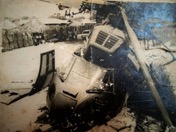The Point Newspaper
Editorial:
Information About Gambia, Jawara, Jammeh and Adama Barrow
The Point Newspaper
Editorial:
May 16, 2025, 12:56 PM

May 15, 2025 standard newspaper.com
By Omar Bah
The Coroner’s Inquest report on the death of Brigadier General Bora Colley has concluded that he died of natural causes. Colley, a former senior military officer implicated in human rights abuses during former President Yahya Jammeh’s regime, died on March 9, 2025, while in state custody. He had voluntarily returned from exile in August 2024 due to deteriorating health and was receiving continuous medical care while detained. The Attorney General requested a coroner’s inquest to determine the precise cause of death, which was conducted under the Coroner’s Act. The report found no evidence of foul play, confirming that Colley succumbed to his medical condition naturally.
Colley’s death has sparked debate about justice and accountability for alleged Jammeh-era crimes, as he was implicated in torture and extrajudicial killings by the Truth, Reconciliation, and Reparations Commission (TRRC). The government has expressed commitment to prosecuting such cases, but Colley’s death ended the possibility of his trial. The inquest aimed to provide transparency amid public skepticism about custodial deaths in politically sensitive cases.

May 15, 2025 standard newspaper.com
By Amadou Jadama on tour
The Chief of Defence Staff Lt Gen Mamat O Cham has given an order to his soldiers to shoot armed robbers who are frequently entering the country, attacking innocent citizens and looting their properties.
Speaking at Lamin Koto and Farafeni military posts during his current tour, CDS Cham told soldiers that the most pressing challenge to national security currently is the constant cases of armed robbery, especially along our border villages. “Anywhere we go, or when we invite people, they all tell us they are worried about their lives and the security of their properties from armed robbers, ” CDS Cham told soldiers.
“These idiots will sleep around the border villages and wait for a Lumo day and while everybody is asleep at night, they would come with cutlasses, or hunting guns terrorising people at gun point and taking everything from them. As soldiers your order is not to negotiate. If anybody attacks any Gambian village or shop, either with a cutlass or gun with the intention to overpower them and take their wealth, and you happened to come across that, the order is to shoot to kill, and there is no ambiguity about that,” CSD Cham ordered.
He said anybody who takes up arms to rob people should be treated as an enemy to the people and the country.
‘As soldiers you should be able to use your training, military tactics and apply your skills to get close enough to the enemy and neutralise them,” CDS Cham drilled his soldiers. He assured the soldiers that his office, the government as well as the president will do everything possible to address their challenges within the available means and resources. The tour continues.
Jun 22, 2022, 11:14 AM | Article By: Yunus S. Saliu
TThe Point Newspaper

This resulted in the death of former vice president of The Gambia, Mr. A.B. Njie and few others.
Others that survived the crash included the late President’s Press Secretary, Jay Saidy, the Secretary General Professor Jabez Langley, Journalist Sulayman Njie (Saul Njie) and the pilot. But Sir Dawda Jawara’s close friend and confidant A.B. Njie, who was the former vice president and Foreign Affairs Minister at the time died on the spot.
Its worth knowing that most of these occupants of the helicopter, according to The Gambia News Bulleting issue of Friday 23rd April 1982, “suffered minor injuries were flown to Dakar immediately while the rest, including the President, went to Bansang Hospital, then to the Royal Victoria Teaching Hospital in Banjul” for treatment.
The day of the incident was described as a “very sad day” by Gambians because the late president just survived a coup seven months earlier before the helicopter crash which was the reason he used the helicopter during his election campaign in the year under review.
According to gathered facts, the former president was advised by the Senegalese security (soldiers) guarding him at the time to travel by air for security purpose taking into consideration his safety after the coup.
“To ensure his safety, the Senegalese army guarding him at that time thought it was unsafe for him to travel by land or in a car to do his campaign and therefore advised him to travel by helicopter as the Senegalese intelligence thought Kukoi Samba’s rebels might still be hiding in the bushes to strike or attack him,” historian Hassoum Ceesay explained.
The crashed helicopter was a borrowed one to the Gambia government then by the former President Abdou Diouf of Senegal “but the helicopter was completely destroyed.”
According to investigation, it was revealed that the crash was due to human error and when it crashed, one of the blades fell off “while the pilot was commended because when the blade fell off, the pilot ran the chopper into a tree to minimise the impact. According to investigation, if he hadn’t done that nobody would have survived the crash, because the chopper would have exploded if crash landed on ground direct” historian Ceesay narrated.
According to the Bulletin, “the helicopter crash-landed between two ancient ‘taboo’ trees on the fence of a compound at the Bantaba of Brikamanding, a village one kilometer from Brikama Ba. It lay in a mess of broken parts, sticks and wires. The door of the cockpit had flung open revealing the smashed dark interior. The main door too was ripped off hinges showing the damage to the passenger compartment. Three fence posts had pierced the underbelly of the helicopter, with one piercing the roof of the chopper.”